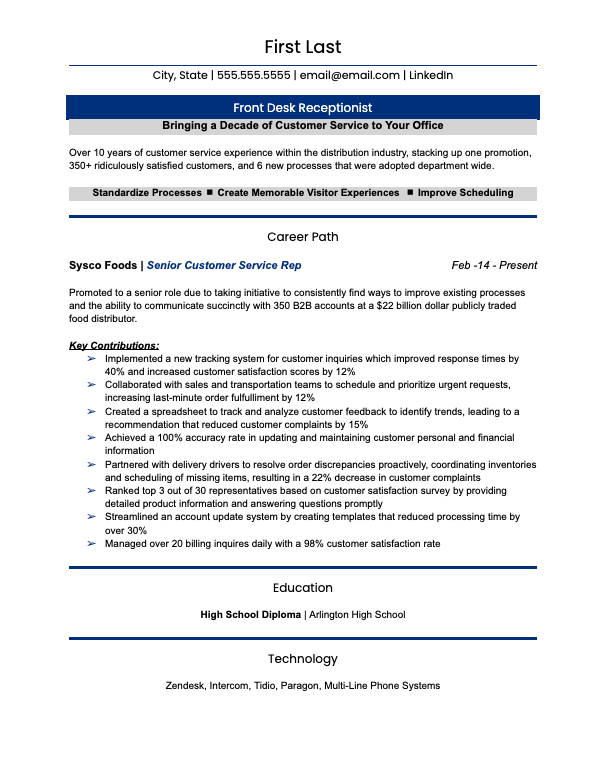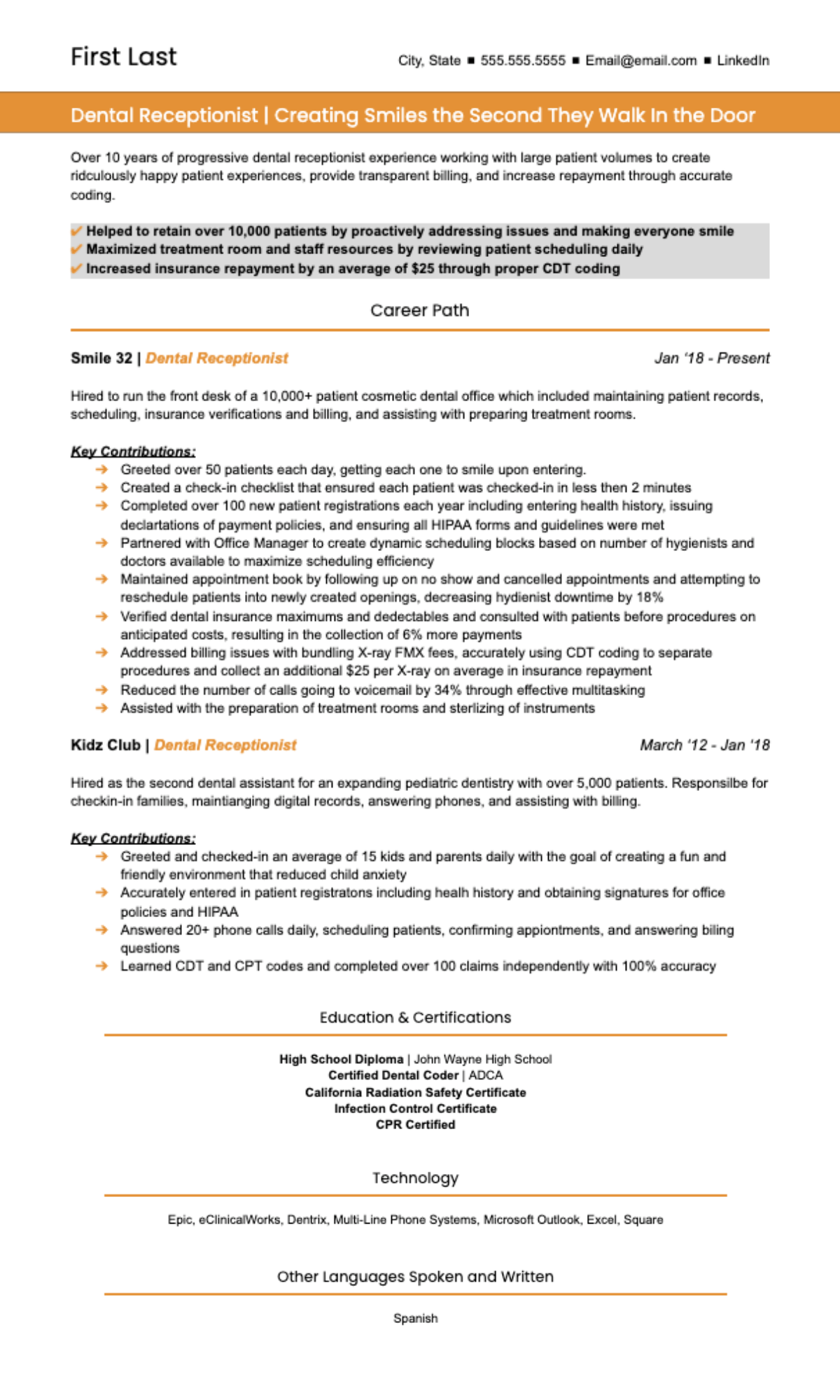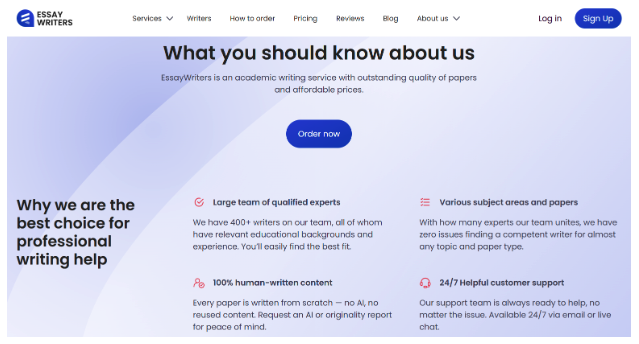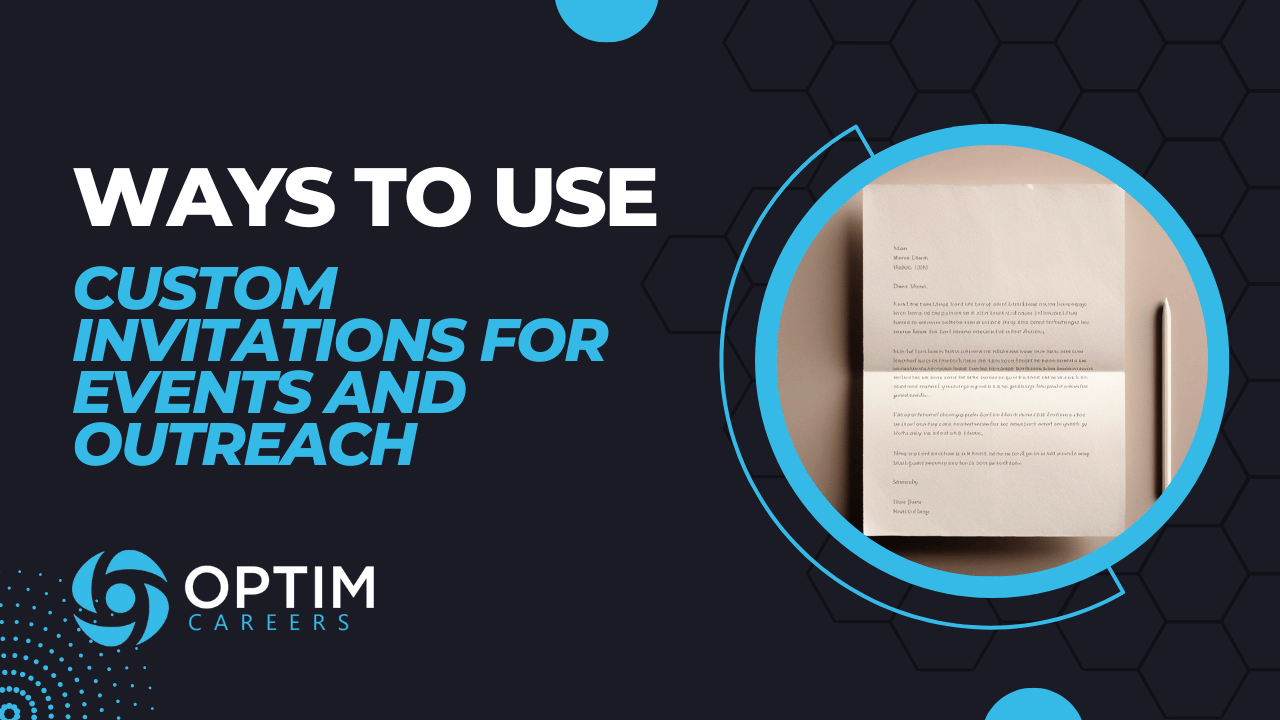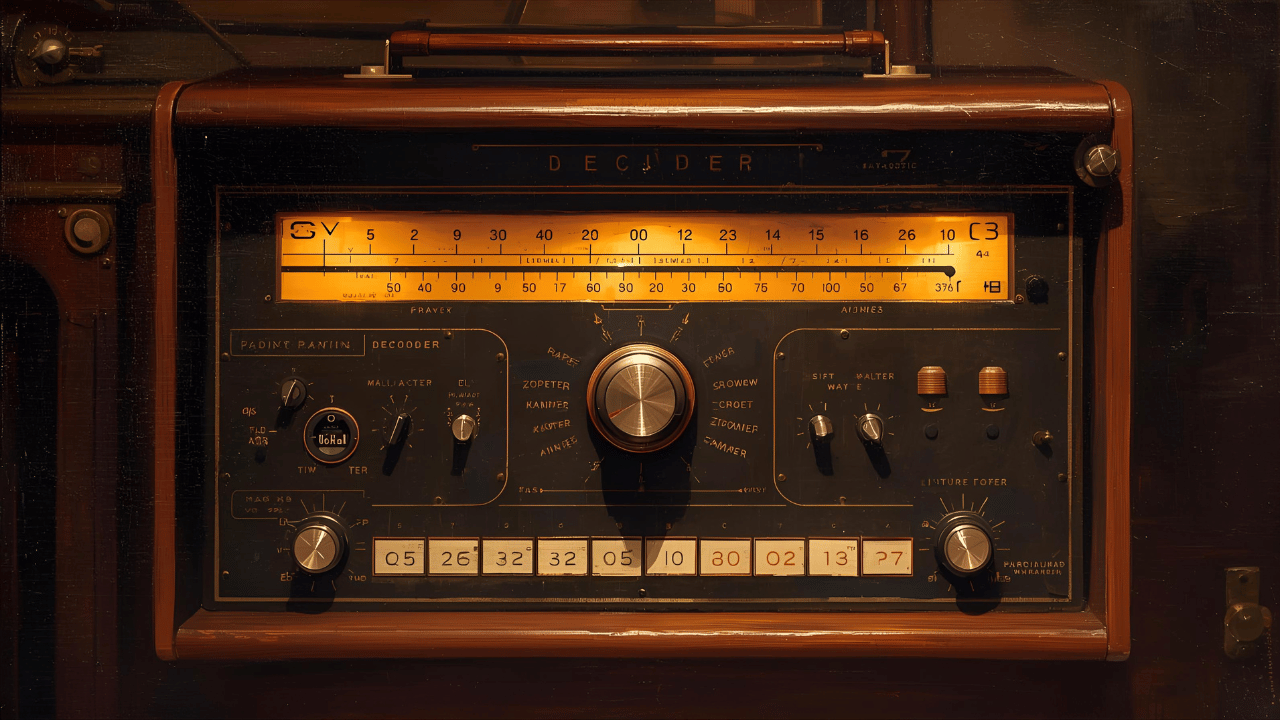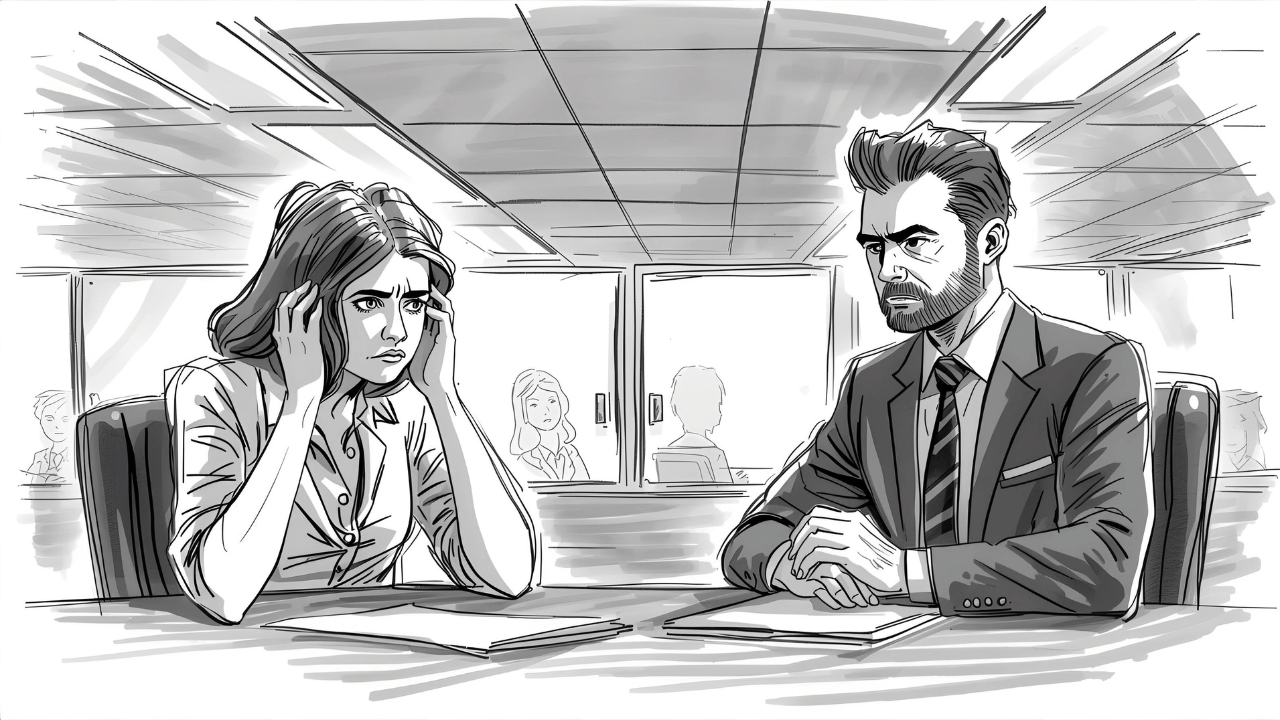Receptionist Resume [Examples and Guide]
There are over 1 million receptionists in the US alone. When I went to Indeed, the world’s largest job aggregator, this week, I found around 69,000 receptionist jobs posted in the past month. That tells me that despite the many openings, there’s a lot of competition for these roles.
Several thousand receptionists (and receptionist hopefuls) search for resume advice every month to help them secure one of these jobs. The problem? Most of it is terrible. The stuff you read probably sounds like this.
Write a dynamic summary, add your experiences in a compelling way, list your education, and include your skills. Well doesn’t that sound nice, but how? And to make it worse, when you look at the examples provided, they’re mostly a bunch of fluffy words that sound nice and lack any meaning. In other words, if you submitted one of those examples, no employer is going to think, “Wow, I need to pick up the phone and interview this person right away.”
So this week, I made some phone calls to employers I’ve worked with in the past to ask about what made them want to interview their receptionist. I also reviewed just shy of 100 job listings for common patterns. Today, I’m synthesizing all that data for you so you can write the receptionist resume you need to compete for one of these jobs.
Determine Receptionist Qualifications
Before you write a resume, you need to have a sincere look at whether you are qualified for a receptionist job. While this may be an entry-level job for many companies, that doesn’t mean you don’t need some form of relevant experience.
Many people who become receptionists have retail, customer service, or hospitality experience. Others have some type of administrative experience. For specific receptionist jobs such as medical or dental receptionists, experience and knowledge in those specific fields will almost be required when the job market is competitive.
While many receptionist jobs are entry-level, some may require several years of experience as a receptionist before the company will consider hiring you, let alone interview you. The more you can target the right receptionist jobs, at the right level and in the right industry, the more success you will experience from your resume.
What Is a Receptionist
For our purposes today, I’m going to break out the answer to this question in three parts: Front Desk Receptionists, Medical Receptionists, and Dental Receptionists. All three are very similar, but there are some nuances between them.
Front Desk Receptionist
These are roles often found in retail and commercial establishments. This job may be in a law office, at a body shop, at a construction office, or even at your hair salon. Many businesses still have receptionists to greet their customers and handle administrative tasks.
These are great jobs to target if you have had previous retail, customer service, or hospitality experience and you are looking for your first receptionist job.
Medical Receptionist
A medical receptionist works in a healthcare office of some kind. Many of these jobs will ask that you have some experience in a medical office setting. You’ll still greet patients and answer phones, but you’ll also be responsible for updating patient personal and financial records, helping patients schedule appointments, ensuring patient satisfaction, and working with others to improve utilization.
Other job titles for a medical receptionist may include medical secretary or medical administrative assistant.
Dental Receptionist
This job is similar to medical receptionist jobs but with some significant differences. In many dental offices, you may also be more involved with verifying insurance coverage and assisting with claims processing. I see this more often in these jobs than in medical ones, probably because many dental offices are smaller. It’s also important that you have knowledge of dental office procedures and the terminology used in these settings.
Receptionist Resume Skills
Let’s do a deep dive into the skills you’ll need to convey in a receptionist resume. I’ll not only list the skills, but I’ll also give you ideas to think about so you can brainstorm the right content for your resume. Later, we’ll put all this together. But for now, take each skill and think about which ones you have experience with and think about examples of those experiences.
Front Desk Receptionist Skills
Data Entry - In your past jobs, have you had to do data entry? What type of data did you enter? Where did you enter it? How much data were you responsible for entering? How did you make sure it was accurate?
Organization - In your past jobs, did you ever have to organize files either electronically or in hard copy? How did you efficiently do this? What processes did you create for yourself to ensure that you did it as quickly as possible without errors? Talking about how you use your organization skills for better time management is also a great way to communicate this skill.
Computer Skills - Make a list of any software applications that you are familiar with. Most receptionists have to know Microsoft Office including Outlook, Word, and possibly some light Excel. Write down your typing speed as well. If you’re unsure, you can take a 1-minute typing test here for free. It will tell you your average speed and accuracy.
Communication - Who did you have to communicate with at your prior jobs? Customers, internal stakeholders, vendors, etc? Make note of all of them. Were there any intense situations that you had to navigate and help resolve? Also, make note of how you communicate with people. Have you used tools like Slack or Teams for internal communication?
Greetings - Most receptionists are tasked with greeting customers and visitors. At your previous jobs, were you responsible for greeting customers promptly? If you worked in retail, you may have had to greet customers within a certain timeframe. What was that timeframe? How do you ensure that you’re courteous and professional to the person you’re interacting with while also making sure new visitors are greeted and welcomed at the same time?
Multitasking - Receptionists have to juggle multiple tasks at the same time. You could be filling out an important piece of paperwork, answering a phone, and greeting a new visitor at the same time. Think of examples where you’ve had to do multiple things at once. What were they? How many? How did you do them all without sacrificing anyone’s service level?
Messages - Many receptionists are the hub of communications for their offices. How do you coordinate customer questions with the right individuals and departments and how do ensure all the information gets to the right place? Think of examples where you have taken ownership, rather than simply passing around messages and forgetting about them. How do you take ownership of each person’s communications?
Issue Resolutions - When visitors or callers have concerns and questions, how do you go about resolving them? Were you able to reduce the amount of time that it took to solve incoming questions? Were you able to reduce escalations to others because you were capable of resolving more questions and issues?
Scheduling - Some receptionists may be in charge of scheduling appointments for customers or executives. What tools have you used for scheduling? What processes should be in place to ensure scheduling is efficient? What suggestions have you made or implemented to improve scheduling?
Maintaining Records - If you’ve been responsible for maintaining records on customers, vendors, orders, or anything, make a note of those things. The type of records and the number of records could be relevant to your future employer.
Ordering Supplies - Many receptionists are also responsible for the procurement of office supplies and other items. How have you made ordering easier for team members or ensured that you don’t overspend your budgets while also not running out of necessary items?
Maintaining Directories and Logs - Some jobs may require you to maintain visitor logs or department/employee directories. Be sure to discuss these items in your resume and if you came up with any process to ensure they stayed up to date, write that down too.
Answering Phones - Many receptionists are tasked with answering incoming phone calls to the general business line. If you have experience with multi-line phone systems or switchboards, take note of that and include it in your resume. Depending on the job, it may be relevant to include call volume. You can discuss skills with both incoming and outgoing phone calls.
Medical Receptionist Skills
Greeting Patients - Most receptionists are tasked with greeting patients. At your previous jobs, were you responsible for greeting customers promptly? If you worked in retail, you may have had to greet customers within a certain timeframe. What was that timeframe? How do you ensure that you’re courteous and professional to the person you’re interacting with while also making sure new visitors are greeted and welcomed at the same time?
Scheduling Appointments - Many medical receptionists are in charge of scheduling appointments for customers or executives. What tools have you used for scheduling? What processes should be in place to ensure scheduling is efficient? What suggestions have you made or implemented to improve scheduling?
Maintaining Patient Records - If you’ve been responsible for maintaining records on customers, vendors, orders, or anything, make a note of those things. The type of records and the number of records could be relevant to your future employer. As a medical receptionist, you’ll likely be responsible for confirming and maintaining patients’ personal and financial information.
Answering Phones - Many receptionists are tasked with answering incoming phone calls to the general business line. If you have experience with multi-line phone systems or switchboards, take note of that and include it in your resume. Depending on the job, it may be relevant to include call volume.
Referring Inquiries - There could be times when a patient calls with a question and you have to refer the inquiry to the right department or person to answer it. Think about the times you’ve done this and how you determined where to send the patient. Also, consider how you ensure a smooth transition and that that patient is connected to the right person before disconnecting with them. In other words, how have you provided great service?
Patient Satisfaction - In many environments, patients may be coming to a medical office because something is wrong. It’s not always the best of circumstances. How do you ensure patient satisfaction with competence and empathy? How do you help comfort patients and reduce their anxiety by preparing them and answering their questions?
Utilization - This is a big one in medicine, maximizing utilization of provider time and resources. How have you helped schedule appointments and manage schedules to ensure that the facility is maximizing the utilization of resources? Have you helped reduce provider downtime because of this? Have you helped minimize wait times because of this?
Office Cleanliness - Most receptionists are tasked with keeping the front desk or lobby area clean and tidy. While you may not be deep cleaning the place (hopefully they hired a cleaning company), you will be picking up after people during the day and keeping everything looking presentable.
Coordinating With Back Office Staff - There is a lot of coordination between staff and patients that occurs in these roles. How do you ensure timely care of patients and communicate with them?
Confirm Appointments - Some smaller offices may have their receptionists confirm appointments with patients ahead of time. How have you done this in the past? What technology have you used? What processes have you created or used to make it more efficient?
Verify Medical Insurance - Not all jobs will require this, but many will prefer candidates with experience or knowledge of how medical insurance works. If you’ve done it before, think about how you verify a patient’s insurance and how you troubleshoot issues with insurance changes in the past.
Dental Receptionist Skills
Greeting Patients - Most receptionists are tasked with greeting patients. At your previous jobs, were you responsible for greeting customers promptly? If you worked in retail, you may have had to greet customers within a certain timeframe. What was that timeframe? How do you ensure that you’re courteous and professional to the person you’re interacting with while also making sure new visitors are greeted and welcomed at the same time?
Scheduling Appointments - Many medical receptionists are in charge of scheduling appointments for customers or executives. What tools have you used for scheduling? What processes should be in place to ensure scheduling is efficient? What suggestions have you made or implemented to improve scheduling? If you’ve used software such as Epic, eClinicalWorks, or Eaglesoft, make note of those. They should be in your resume.
Answering Phones - Many receptionists are tasked with answering incoming phone calls to the general business line. If you have experience with multi-line phone systems or switchboards, take note of that and include it in your resume. Depending on the job, it may be relevant to include call volume.
Issue Resolutions - When patients have concerns and questions, how do you go about resolving them? Were you able to reduce the amount of time that it took to solve incoming questions? Were you able to reduce escalations to others because you were capable of resolving more questions and issues? How do you address concerns with empathy?
Verify Dental Insurance - Many of these jobs require experience or knowledge of how dental insurance works. If you’ve done it before, think about how you verify a patient’s insurance and how you troubleshoot issues with insurance changes in the past. You may even assist with processing insurance claims at smaller offices, so be sure to include any knowledge you have of this.
Maintaining Patient Records - If you’ve been responsible for maintaining records on customers, vendors, orders, or anything, make a note of those things. The type of records and the number of records could be relevant to your future employer. As a medical receptionist, you’ll likely be responsible for confirming and maintaining patients’ personal and financial information.
Coordinating with Hygienists - An important part of this job is coordinating with hygienists to ensure a smooth patient flow. How do you keep everyone updated on when patients arrive and wait times? How do you work with other team members to ensure backlogs are reduced?
Ordering Supplies - Many receptionists are also responsible for the procurement of office supplies and other items. How have you made ordering easier for team members or ensured that you don’t overspend your budgets while also not running out of necessary items?
Dental Office Procedures - Most offices will want you to have some working knowledge of the procedures and terminology they use. Incorporate some of these into your resume.
What If I Don’t Have All the Experience
As you read through these lists you may realize that you don’t have all the experiences listed. This is what we call skill gaps and the more you have, or the more significant ones you have, the less likely you are going to be able to obtain interviews for a receptionist job.
Many people think getting experience to get a job and getting a job to get experience is a vicious chicken and the egg type argument. But it’s not. You don’t need a job to get experience or knowledge.
For most receptionist jobs, you don’t need much, if any, prior experience as a receptionist. You do need to know how the job works and a basic knowledge of the skills above. You don’t need a job to do that and you don’t need to pay anyone to do it either.
Almost all education is free if you know how to search for it online. I would start there.
Receptionist Resume Templates
Let’s recap for a minute. At this point, you’ve gone through the skills lists above and brainstormed experiences and examples that align with each. Before we start writing, I suggest you find a resume template you can use. This will make things easier because you won’t have to learn about resume formatting. A good template will take care of all of that for you.
I tried to find templates and use AI resume tools that have templates built in, but I couldn’t find anything that I felt comfortable recommending. I enjoyed some of the resume builder features, but none of them checked off everything to make a great resume. So I built 3 resume templates, one for each type of receptionist we are discussing.
They are all built using Google Docs, they are 100% customizable, and have preset information in them which you can either keep or adapt to match your unique qualifications. Either way, they will save you hours of work.
You can access all three resume templates and edit them here. Or you can view the samples below for inspiration to create your own.
Front Desk Receptionist Resume Template
I created this front desk receptionist template based on a job seeker who has never been a receptionist before but has spent several years in customer service. For this template, I focused on the similarities between the two jobs such as: creating memorable customer experiences, scheduling, maintaining records, and answering phones.
This imaginary person is also really good at analyzing information and creating spreadsheets and templates, so I built that as a bonus skill into the narrative.
Medical Receptionist Resume Template
I based this medical receptionist template on a job seeker who recently graduated high school, had a year of retail customer service experience, and a few months of experience as a receptionist at a retail body shop.
You’ll see how I aligned many of the things they did at their current and past jobs with the skills I discussed earlier and used words that elicit similar ideas in the reader’s mind. For example, although they haven’t worked with health insurance claims or verifications, they have worked with care insurance claims, so we mention that.
I’ve also crafted a narrative with this resume that shows this individual as someone who reduces wait times, improves resource utilization, and provides exceptional service. I then used each work experience to back up that narrative with results and details to support the claim that they are the best at these things. It’s a blend of responsibilities, skills, and results.
Dental Receptionist Resume Template
For this resume template, I based it on someone who has been working as a receptionist for some time. You’ll notice that the experiences are much more robust, indicative of their tenure and time in a dental receptionist role.
The narrative for this resume was someone who not only provides great customer satisfaction but also can assist in other areas of the office when needed. In addition, this is someone who deeply understands CPT and CDT codes which are very important for repayment.
What Work Experience Looks Like in Successful Receptionist Resumes
I almost always start a new resume with the work experience section, not the summary. This helps me get all the relevant material from my background on paper in the right places so I can come back and synthesize a summary based on my accomplishments.
There are many ways you can write about your work experiences. I like to incorporate a job summary with contribution bullets. But regardless of how you decide to format it, here is what it must contain.
Read It As the Employer
If you were hiring for this job, what would matter to you? I listed many key skills and talking points in an earlier section - follow those. When you determine what you will write, ask yourself, if I was the employer reading this, would I care about it? What does it say to me? In other words, it has to be relevant.
This is especially important if you’ve never held a receptionist job before. In one of my resume templates, I pretend to be someone who worked at Nordstrom as a sales associate. You’ll notice I never talk about sales or anything of the sort. That’s because someone hiring a receptionist most likely won’t care about that. You have to translate your experience into something the employer can understand and relate to. And remember, they may have never worked in retail before.
If you struggle with this, I recommend using the AI resume builder that Huntr offers. To date, this has been the best resume AI I’ve seen. If you’re trying to obtain your first receptionist job, combining my resume templates with Huntr’s AI for work experience achievements will greatly improve your resume. It’s well worth the investment.
Include Context
When employers hire, they look for matches. The more you look, feel, and talk like them, the more likely they are to want to interview you. Here’s what I mean. If you serviced 100 customers per day and the business you’re applying to also services around the same amount of customers, you want to mention that detail in your resume.
If you’ve used the same software, that’s important. If you’re applying to a pediatric dentist's office and you’ve worked at a pediatric dentist's office in the past, make sure that is explicitly listed in your resume. You’ll see examples of this in my templates.
Sometimes the context makes a big difference. Many of your peers may have the same experience in terms of job duties as you have listed on their resumes, but the context can help you stand out from them.
Show That You’re Good at the Job
For years resume writers have been screaming for you to include results and quantifiable achievements. But I think that’s a poor way to advise people. The result of that has been many people including a lot of numbers that simply make no sense.
Instead, think of it this way. For every job duty that I can do and have experience doing, how can I show that I was good at that responsibility? Most likely it will involve numbers and data, but asking this question will make sure you have the right numbers. And sometimes, you don’t even need numbers.
Here’s an example from one of my templates.
I wanted to show that I was good at greeting customers. I asked myself, how could I measure this and communicate it? Here’s what I came up with.
Greeted over 50 patients daily, getting each one to smile back at me within their first 5 minutes in the office.
Here’s another example from my templates.
I wanted to show that I could code and bill for dental insurance. I asked myself, how could I show that I was good at this? Here’s what I ended up with.
Addressed billing issues with bundling X-ray FMX fees, accurately using CDT coding to separate procedures and collect an additional $25 per X-ray in insurance repayment.
Anyone who reads that knows that I know my coding and that I’m really good at it.
My resume templates are loaded with stuff like this. I encourage you to read them and try to replicate the same idea in your resume.
Receptionist Resume Summary
After I’ve finished writing about my work experiences, I then write a summary for my resume and a possible tagline if I feel like it. The problem with most receptionist resume summaries is that they are meaningless.
Most of them could belong to anyone, they’re filled with resume buzzwords that communicate nothing of value to the person reading it.
Here’s one from one of the leading articles with receptionist resume examples:
Friendly, organized receptionist with significant experience in fast-paced healthcare environments. Committed to providing exceptional customer service and effective administrative support while embracing new challenges and skills.
Wow. Sounds nice doesn’t it? But does it mean anything? No. This could literally belong to anyone. Who says that they’re not friendly or that they are uncommitted to providing customer service? No one.
It’s also vague, which is a problem. It mentions significant experience. Here’s the problem with language like this. It’s subjective. I can promise you that no employer is basing a high-risk, very expensive investment (that’s what you are by the way) on subjective information.
Never sacrifice clarity for sounding smart or looking good. Be clear.
The other problem with summaries like this is they offer no tangible value to the employer reading it. I can’t say with certainty what you can do for me. And if I’m going to spend $40,000 plus on something, I better know what I’m spending it on. Wouldn’t you want to know if you were spending that much money?
I want you to compare the poorly written resume summary above with one from my template.
When I read this, I know exactly what I’m getting for my $40,000 investment. I’m getting someone who can help me reduce wait times, improve our resource utilization, exceed my patient’s expectations, and handle high call volumes and patients in the office. It’s clear.
And then as I read the work experiences, I can see evidence that backs this up.
You need to be known for something, something specific. Know what you bring to the table and communicate that in your resume summary.
Receptionist Resume Education & Certifications
Almost every receptionist job I’ve recruited for in my career has explicitly asked for a high school diploma. If you’ve read some of my other resume guides, you may have noticed that many times I don’t recommend listing high school diplomas on resumes.
This is the exception. Most receptionist job descriptions will state that it is a requirement and you need to list your diploma. You’ll see this in all of my resume templates. If you graduated with an honors distinction, you can list that too. You’ll see an example of that too in my templates.
Certifications can be important for medical and dental receptionists. If you have those, I would put them in this section. If you’re a certified medical assistant or a certified dental coder, include those here. Many smaller offices prefer people with a CPR certification. That could be relevant to include as well.
Receptionist Resume Skills Section
It is rare that I ever include a skills section that resembles most examples you’ve probably seen on the internet. Many skills sections include things like these:
Excellent communication skills
Data entry
Organization
Attention to detail
Friendly customer service
In my opinion, this is wasting space on your resume. You may think it looks nice to list it out, but in reality, it’s kind of like that poorly written-resume summary I showed you earlier. It’s void of meaning and vague. What does attention to detail look like to you? Is it the same as what the employer views it as?
Instead, I prefer the show, don’t tell method. If you write a well-crafted, articulate resume, you don’t have to tell me that you have excellent communication skills. I can see it. And you know what they say? Seeing is believing.
If you organize your resume in a way that is easy for me to understand, is logical and well-structured, you don’t have to tell me that you’re logical and organized. I can see it.
If you write about how you answered 40 calls by the second ring and greeted 50 customers within 30 seconds of entering the office, you don’t have to tell me that you possess great multi-tasking abilities. I can see it.
You get the idea. Show, don’t tell.
So what about that skills section? Should you have one? Yes. And it most likely will be at the end of your resume, because it carries the least weight with employers.
I often label this section, technology. This is where I can include all the relevant hardware and software that I can operate.
Because you’re applying for a receptionist job, you should probably have something about multi-line phone systems. Some of you may include scheduling software, CRMs, patient data portals, project management tools, and things like Outlook and Excel.
If there’s a chance you might use it in your next job and you know how to use it, include it. Notice that I didn’t say that you had to have used it in a previous job. Here’s my qualification for including these skills. If you know enough about it that you could open the application and quickly navigate your way around it, then list it on the resume.
This means that if there is a required software and you haven’t used it before, you could go learn it on your own, do a free trial and experiment with it, become familiar with it, and then list it on your resume. You can build qualifications outside of a job.
Receptionist Resume Examples
Below are three resume examples that I created using Google Docs. You’ll find one for someone with entry-level experience, one for someone with a lot of experience, and one for someone pivoting with no experience. They are also separated by type of receptionist to give you ideas for retail receptionists, medical receptionists, and dental receptionists.
You can access all three in an editable version which will save you time and eliminate some frustration from the resume writing process. If you need more help, you can even check out my coaching program which includes a resume course and unlimited access to me in a 1:1 setting for guidance.
Front Desk Receptionist Resume Example
Medical Receptionist Resume Example
Dental Receptionist Resume Example
Receptionist Resume Builders and Resume AI Tools
These tools are all the rage right now, and in the right hands with the right expectations, they can be a game-changer for you. Here’s what you should know if you’re going to use a resume builder to help you with this resume.
First, I have yet to see a resume builder with AI that does everything well. Expect to sacrifice something with every tool you see. Some have better AI suggestions than others. I call them suggestions because that is what they are. They’re designed to help you get started thinking about what you could write. I would never use them as is. The technology just isn’t there yet.
Others have great customization abilities (which I think is incredibly important) but have terrible AI abilities. Be prepared to be disappointed if you think you’re going to get everything you need in one program.
Second, I would only use the AI for work experience bullet point suggestions. I would not use it to write resume summaries. It will give you examples similar to the ones I warned you not to use. Avoid the summary AI writers. The technology just isn’t there yet.
With that being said, I tested ten of my favorite resume builders with AI to write the resume templates and examples I shared in this article. Two of them I would recommend for those of you writing a receptionist resume.
Resume Builder for Career Veterans
If you have been a receptionist for several years already, your best resume builder is going to be Teal. The AI does a great job at generating achievement-based suggestions for your work experience bullet points if your previous jobs were receptionist jobs. It will give you good suggestions that you can then apply to your background and mold into something usable.
You can try Teal for free by clicking here.
Resume Builder for Career Changers
If you’ve never been a receptionist before and you’re trying to secure your first receptionist job, your best resume builder with AI is going to be Huntr. For example, if you need help translating your retail experience into something relevant for a receptionist job, this AI can do what Teal could not do for me. Huntr built its AI so that you can focus the suggestions based on your target job and not the job you have now.
A subscription to Huntr also includes one of the easiest-to-use (and my favorite by far) job search trackers.
Receptionist Resume Writers
For some of you, you may be reading this thinking, I don’t have the time or want to put in the time to write my best receptionist resume. That’s ok. Learning to write a resume is a skill and skills take time. Some of us don’t have the time to learn a new skill as we try to get our resume “right” over the next few weeks or a month.
If you’re looking for a resume writer who is affordable and has written other receptionist resumes for my readers with success, I would recommend Resume Zest. They are the most affordable resume service I’ve found that also does quality work. Many of their writers are former recruiters like me or have spent time in human resources.
Receptionist Resume Recommended Reading
Receptionist Certifications (coming soon)
Where to Find Receptionist Jobs
Receptionist Salaries (coming soon)
Cole Sperry has been a recruiter and resume writer since 2015, working with tens of thousands of job seekers, and hundreds of employers. Today Cole runs a botique advisory firm consulting with dozens of recruiting firms and is the Managing Editor at OptimCareers.com.


